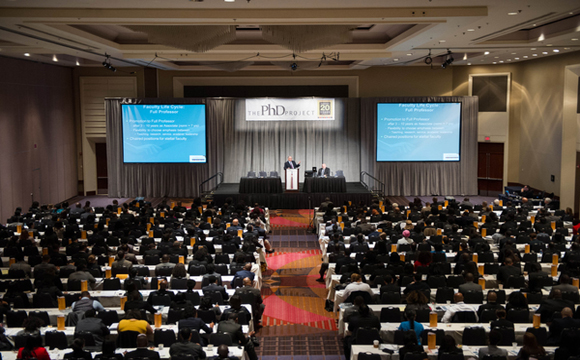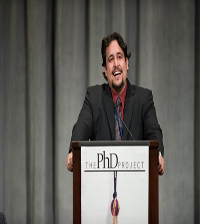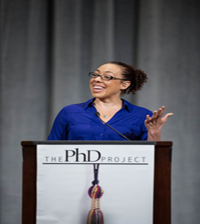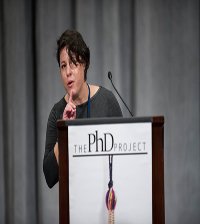What are the perspectives of doctoral students from The PhD Project?

During The PhD Project’s November 2013 Conference, minority doctoral students provided perspectives about life as doctoral students in different stages of their doctoral programs. These individuals included Alfred Castillo, a second year information systems doctoral student at Florida International University; Jamie Weathers, a third year finance doctoral student at Temple University and Cinthia Satornino, a fourth year marketing doctoral student at Florida State University. An excerpt of Castillo, Weathers and Satornino’s perspectives follows:
Castillo’s Perspective – While working as an operating system programmer, I learned that a Chief Information Officer (CIO) was let go from his position. By believing a CIO position was possible, I decided to go to Florida International and do a master’s degree in Management Information System in order to become a CIO. While working and being mentored by professor Xia, I saw that we had similar interests. He told me about pursuing the Ph.D. and receiving a stipend of $26,000. This was significantly lower than my regular salary. After thinking about it for a long time, I determined what I had to do to make the necessary sacrifice. I listened to my mentors and pursued the challenge. My advice to potential candidates is to, “Avoid discrediting yourself, you are at the conference for a reason.” You are smart and can do this. The PhD Project is all about encouraging you to succeed and improving diversity in higher education.
To paint a picture of what it is like in the doctoral program, I say, “Run as fast as you can.” The doctoral process is pretty bad. You have to work a lot of hours. A lot of people thought they could do the doctoral program while working. There is no way you can work and complete the Ph.D. Don’t work part-time either. As a full-time student, my first year was a culture shock. There is no hiding in the classroom when there are only six students in the program. If you did not do your work, it will show. You must be capable of analyzing research to show you are evolving as a Ph.D. candidate. You have to write research papers and proposals for each class. This can help to determine what you may have an interest in which is what happened to me. For those who strive to receive straight A’s, I say, “don’t.” You must balance your time to fulfill all the requirements of the doctoral program including teaching.
I was swamped in the second year of the doctoral program. I tried to do my work as well as that of my professors. Time management is important. If you don’t manage your time, you will get swamped. Additionally, I had no one to talk to and that is one of the advantages of The PhD Project. Through this process, I am able to collaborate with constituents of The Project and prepare for different challenges. I don’t want to suffer while in the program. I want to learn from someone who has already suffered which is a helpful benefit of The PhD Project. The final point is, try to finish the program as soon as possible. Remember, a good dissertation is a done dissertation.
Weathers’ Perspective – In 2010, I attended The PhD Project November Conference. By the time I had arrived to the conference, I had already decided this was the path for me, but it took me about two years prior of consideration and conversations with faculty from my MBA program and friends to arrive at my decision. A MBA is great preparation for a corporate career, but it is not very helpful in the preparation for a doctoral program. When thinking about pursuing a Ph.D., I initially thought doing the dissertation would be too difficult. Now, I am a third year finance doctoral student. I have not completed my dissertation yet, but I no longer fear it. I know it will take time, effort, and likely a lot of tears, but it seems an achievable goal to me now.
The biggest hurdle for me, as a single mom in the program, has been balancing the doctoral program with my responsibilities as a mom and living on the stipend which is not meant to support two people. Since having my daughter, every decision I have made was about taking care of her emotionally and financially. I was able to accomplish that while working in both the mortgage industry and energy-consulting field over the past decade, but something always felt amiss in my life. I thought there must be a better way for me to have an impact on the world around me and make a decent living to care for my daughter as well. I also wanted more control of my time. I believe that a Ph.D., especially in business, offers this opportunity.
If you decide to pursue a Ph.D., you must be committed to the program. It is not easy. In fact, it is extremely hard. You need to be sure this is for you. I have 2.5 years of course work in my program and I’m in my last semester of courses now. I will take my Comprehensive Examination in February 2014 and then fervently get to work on my dissertation. I know that The PhD Project is there waiting to celebrate each of these milestones with me. What is most amazing about The PhD Project is that you can build a wonderful support network with the people you meet in this organization, and they are there for you through the peaks and valleys.
The PhD Project is like a family. It is different than the connections you have with your cohort at your school. In fact, my school colleagues have expressed their wish for such a support system. So, please understand the value of this organization. If you decide to purse a Ph.D., use this organization as other students have done, because you will find yourself in times of doubt, frustration and even isolation. Everyone I have encountered in this organization wants me to succeed and offers his or her help or sometimes just a friendly ear to help me get to the finish line. As a final piece of advice, start saving your money now! Don’t wait until you get accepted into a doctoral program, because the shift in income is drastic, especially if you are accustomed to a corporate career paycheck. Start downsizing and adjusting your spending habits now in order to make a smooth transition.
Satornino’s Perspective – I am in my fourth year as a marketing doctoral student at Florida State University. While everyone has a reason why pursing a Ph.D. is challenging, it is doable. All of us on the panel had to make sacrifices, too. For instance, it wasn’t just me making sacrifices. I have two kids and a husband, and they had to sacrifice too. My husband is a stay at home dad, so I am the only breadwinner for a family of four. Yet, I gave up a six figure job for a $15,000 stipend. So, in addition to the role of a doctoral student, I have two kids who expect me to be a mother and a husband who expects me to be a wife. I still have to cram all of this doctoral work into the life of a wife and mother. And my husband had already made sacrifices – he gave up his job for me to pursue my MBA. Yet, I had to ask him to make more sacrifices. It was not easy to ask, or to accept, but I felt compelled to follow this path. You have to believe you can do it too, and be driven to it.
Everyone here made sacrifices too. But despite all the sacrifices we would have to make, we all knew we could do it. We were all inspired by someone to do so. For me, it was my mother. She dropped out of school after she got married, and focused on raising her three kids. After they divorced, my father left her with very little. Yet, she put herself through college as a single mother with three kids. I knew if she could do it alone, I could certainly do it with the support of my husband. Everyone in a doctoral program had someone believing in them. You do too. Everyone here believes you can do it. So I was you in 2009; I came to The PhD Conference and was sitting in the seat where you are now. I was thinking to myself, “There is no way I can do the Ph.D. I have a nice life, a house, financial responsibilities, etc. There is no way I can complete a Ph.D.” But I felt driven to do it.
And I did everything wrong. For example, I applied to only one program. I didn’t research schools or faculty. I didn’t even know what I was getting into. But I was lucky. While at the conference, I sat next to Stephanie Lawson, who at that time was a Ph.D. student herself. She said, “Whatever you do, talk to Dr. Mike Brady at Florida State University.” She called every month to ask if I had called the professor. When I finally called him, we talked for two hours. He told me to send my application and that I would be accepted.
This whole doctoral process is like dating. I married my husband after 16 days from our first date. Just like my marriage, I picked my Ph.D. program on instinct. It’s also like dating when you pick your dissertation chair. And, again, it is the same thing when you are in the job market. In all cases, you want to pick a place that fits you. Don’t pick a place because it is in a cool or big city. Don’t just go to the most prestigious school – although that might be the place where you belong – don’t let that be your only guide. My colleague Maurice made his decision based on the professors that responded to his email. He was looking for the right fit! Go to a place where a person puts their arms around you and says they’ll be your champion. Go for that gut feeling. So, if you do this, make the decision about where to go with your heart, not just your mind. After all, it’s your heart that will drive your success. So, that’s what I did. Although my background was management, I applied to the marketing program at FSU under Dr. Brady.
Luckily, I was accepted into the program, but all of the good advice I got at The Project leaked out of my head when I went to school. I didn’t prepare for a Ph.D. program at all. To the point where, the first day of school, my first seminar professor, Dr. Demetra Andrews, took me aside and said, “Honey, you need help.” And she became my champion in the program. Again, I was lucky. But the truth is, you have to be prepared because you have no idea what it really takes to do a Ph.D. when you’re standing on the outside. The biggest challenge is not work, it’s psychological. You all are smart – so was I, but all of a sudden I was the dumbest person in the room. That’s difficult to deal with. I worked in Corporate America for 12 years after finishing my undergraduate degree, and I was successful and well respected. But as a doctoral student, you have to redirect your thinking, so you are starting fresh; you don’t know anything. So you must be okay with being the dumbest person in the room, and love learning until it hurts! If you do, although you might become frustrated and tired, you will not be bored, and you will enjoy the process.
For example, coursework is hard, but when you get through it, you will look back at your time and coursework and miss it. I miss it! I learned so much. Regarding the comprehensive exams, I got the best advice from someone at the conference that said, “You already know everything you need to know to pass comps. This process is about trying to figure out how you think. Can you think critically? Can you answer questions in a way that is unique and interesting? Can you find the tools to support your decision? Are you a logical thinker? Yes, you have to memorize and cite references, but people want to know if you can think critically. You have the skills already, and the program is about ‘filling up the tool box.”
You will have moments of doubt, and it’s the people who really get you through the tough times. Even though I’m almost done, I still call on my Ph.D. colleagues for advice. They genuinely want to help you. While I was searching for a job, I called on my mentors from the PhD Project. They all happily helped me prepare. In fact, they went above and beyond to do so. For example, Dr. Jose Rosa went through my job packet line by line, over and over again, to make sure it was as good as possible. He also helped me in designing a strategy for the job market. Dr. Tiffany White and Dr. Lenita Davis grilled me in a mock interview in preparation for my real job interviews. Thanks to their support, I was very prepared, and was able to go into the job interviews with confidence. After receiving several callbacks, Dr. Vanessa Perry and Dr. Rosa again helped me in selecting the right school for me. Everyone wants to see you succeed and they gladly help you when you ask.
Finally, I believe that if you do what you love, you will never work a day in your life. In my fourth year, I now work at home, and can spend more time with my kids. I am very happy because I love what I do, and being a professor does not feel like work. I have spent a lot of hours on the computer, but I have yet to work in this program. I love every second of what I am doing. It’s true that the doctoral program presents a lot of challenges. It is tough. You make a lot of sacrifices. But if this is for you, it will not feel like work and you will find it very fulfilling. By the way, if you’re looking for a program, FSU is awesome.
Dr. Ronald Holmes is the author of four books, “Education Questions to be Answered,” “Current Issues and Answers in Education,” “How to Eradicate Hazing and “Professional Career Paths.” He is publisher of “The Holmes Education Post,” an education focused Internet newspaper. Holmes is a former teacher, school administrator and district superintendent. He can be reached at [email protected].
–All photos courtesy of Brian Kersey–




